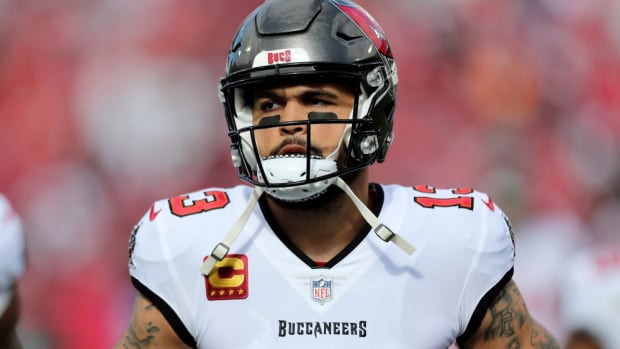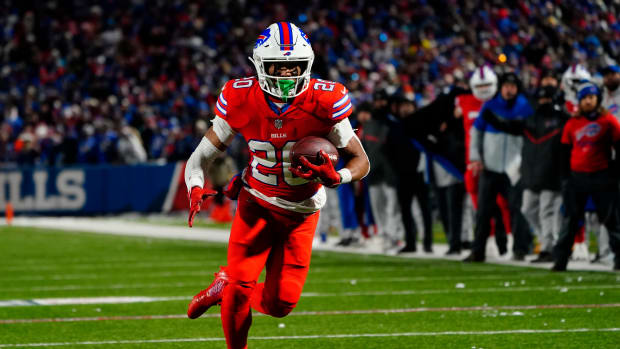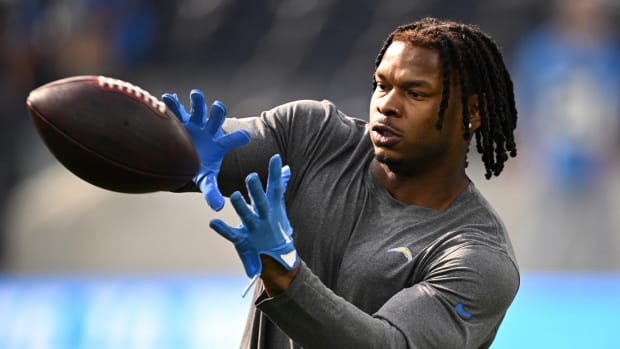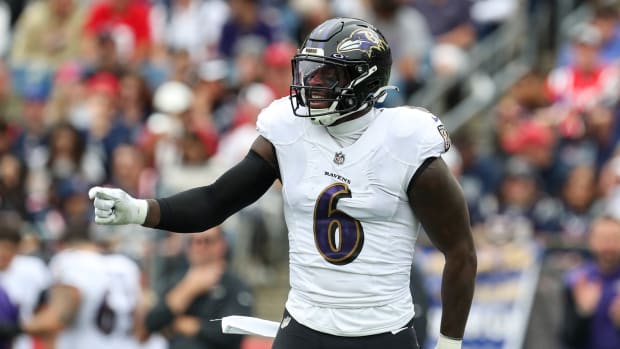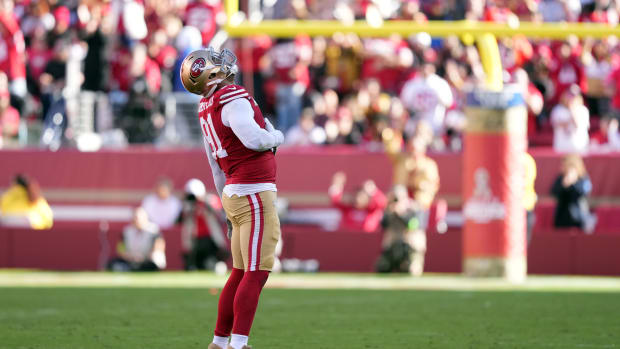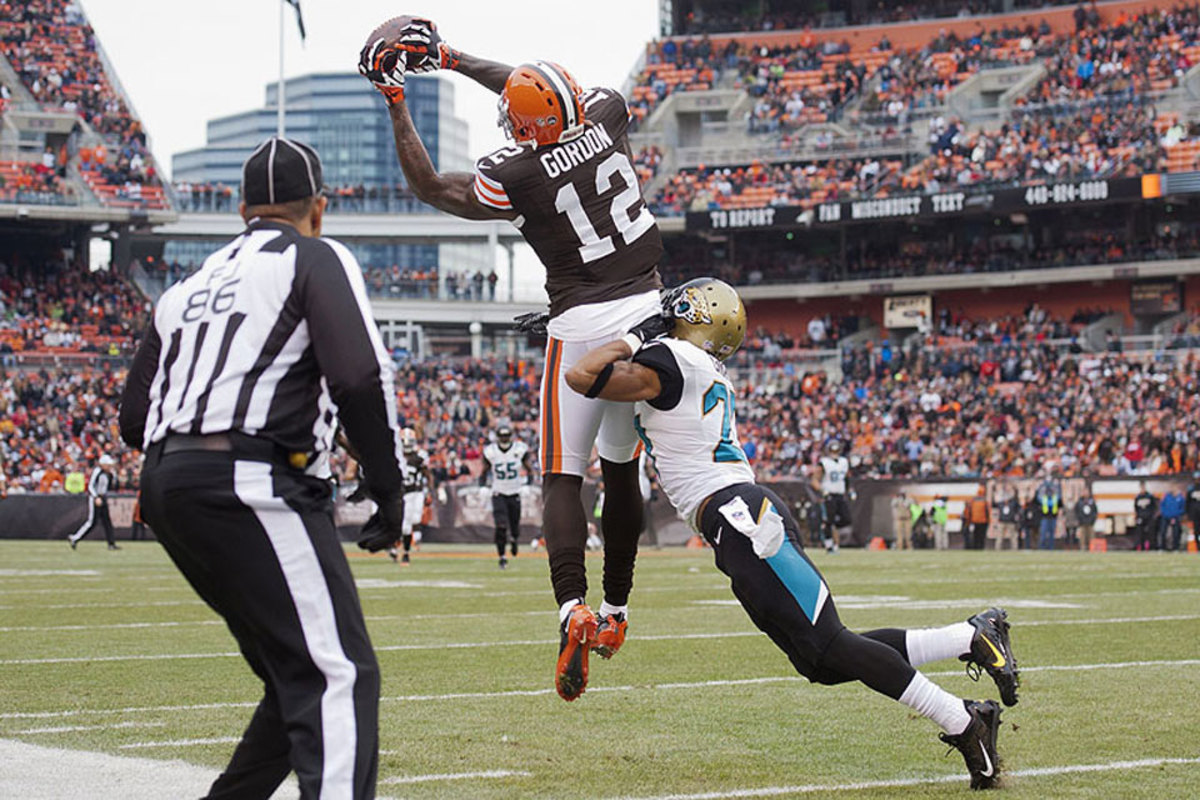
Josh Gordon Has Arrived
BEREA, OHIO — The buzz was so much softer two summers ago. And yet it rang out so clearly to Josh Gordon amid the dead quiet of the Texans’ practice bubble—over the steady July rain pummeling the roof, over the murmuring of some 20 pro scouts gathered along the sideline for his pro day, over the frantic beating of his own nervous heart. It was as if the surrounding fluorescent lightstands producing all that hypnotic feedback were wired to Gordon’s jangling nerves.
Gordon had cracked under pressure before, but those situations all came off the field. Between the white lines? Few receivers were cooler. This situation, though, was different. This was the chance he couldn’t blow. Not after getting booted from Baylor after barely two seasons, and walking out on Utah after a semester. Not after spending the past seven months scrambling to take online classes, and running for miles in the predawn as if it might somehow bring him closer to fulfilling the NFL career others always envisioned more vividly than he ever could.
It was this potential that had lured so many pro talent evaluators here, to Gordon’s hometown, on the eve of the NFL’s supplemental draft. There were no other prospects to break up the quiet, to distract attention from the maddening marvel in a beat-up Baylor T-shirt and the Adidas cleats scored from the free table in his agent’s office. Ole Miss quarterback Jevan Snead was just an arm. Gordon can’t throw to himself.
Josh Gordon has taken some time to straighten out and find himself, but in his second season in Cleveland he’s leading the league in receiving yards and threatening the all-time per-game record. (Simon Bruty/Sports Illustrated)
Making it through the physical evaluation was the easy part; four years of big-time football—two at local high school powerhouse Lamar; and two more at Baylor, where Gordon tallied 714 yards and a team-leading seven touchdowns in a breakout sophomore year—had put little stress on his 6-3, 224-pound frame. His 82-inch wingspan, 36-inch vertical and 10-1 broad jump ticked more boxes on the game-breaker wish list.
But the 40-yard dash? Gordon hadn’t spent much time on it during his 10-day training camp, itself a joke compared to the two months the average NFL prospect takes in preparation for his pro workouts. The faint muscle memories he built on the 4 x 100 relay team at Lamar would have to carry him through. Gordon's first time, 4.52 seconds, would have tied for 11th-fastest in his position group had it come at the Combine, but he wasn’t as thrilled with it as the onlookers were. With one more try left, he pushed himself even harder—“At that point,” recalls the 22-year-old, “you’re just running into your future”—and, steps from the finish, partially tore his left hamstring.
The injury hadn’t cost him much time—only three-10ths of a second—but his future was in serious trouble. Again. Pain was quickly overtaking his body. As the three-cone drill was being set up, Gordon passed along word that he couldn’t do it. The scouts could hardly contain their rage. He’s not going to do it? I thought we came here to see the full workout! That buzz from earlier? You could scarcely hear it now.
Here, finally, was the Josh Gordon that had raised so many red flags. The diva. The guy who plays on his terms. If he didn’t win this crowd back, his NFL journey wasn’t going much further than the tour of Texans complex that GM Rick Smith treated him to before this workout. Not only did Gordon have to go through with the finale—the receiving drill—he had to nail it.
The setup was like something from an Upright Citizen’s Brigade show, with NFL reps calling on Gordon to improvise his way through an array of patterns he’d never run before. The more challenging the crowd suggestion—a Patriots rep insisted on seeing a China route, the Wes Welker square-in that had Gordon, gimpy and primarily a go-route specialist at Baylor, stumbling—the more it felt like revenge for backing out of the 3-cone. But Gordon kept sprinting, kept cutting and kept catching—through the pain, through some 30 requests—without a ball ever touching the turf. After 90 minutes of hell, Gordon had survived. He never thought the day would come when he could say he did.
* * *
Gordon burned brightly at Baylor, catching passes from RG3, but lasted just two seasons. (Manny Flores/Icon SMI)
Josh wasn’t supposed to struggle. He was supposed to catch whatever life threw at him. He was always so mature for his age—22 inches at birth, 6 feet by age 13—and all the while those lion paws he called hands never seemed to get any smaller. Those hands, recalls Tracy Robertson, a defensive tackle teammate of Gordon’s in high school and college now on the Chicago Bears practice squad, are what added a note of trepidation to every encounter with Gordon, even when he came in peace. “I thought I was a big guy,” says the 6-4, 280-pound Robertson, “and then I’d shake his hand and he’d cover it up to my wrist. That’s not something you want to be a part of too many times.”
Still, you wanted to be around him. You had to see if the rumors were true—not least the one about him “not just dunking a basketball, but slamming it home” from a standstill, his brother Harold says. It was hard to believe that the same hands that were snatching fastballs and footballs could also drop volleys and drain putts. Throughout, Josh struggled to see what all the fuss was about, which made him even more beguiling to his slack-jawed observers. “Sometimes the things that make you more sure about another person are that they don’t understand or they’re not as sure about their ending point as you are for them,” Robertson says.
Josh’s old soul was another source of intrigue. On the slim occasions he felt like really talking, what came out went way deeper than his soft baritone delivery. He listened to Miles Davis, filled notebooks with poetry and read Mildred D. Taylor novels, about the strains on African-American families in the Deep South during slavery and the Great Depression.
But as he grew older and his middle-class family life began to deteriorate, Gordon found it tougher to discern fact from fiction. Just like that, the radio ad sales game turned on his father, Harold Sr., leaving his mother, Elaine, an elementary school teacher, to pick up the slack. The family moved eight times (a few times separately after a divorce in 2006), and the accommodations around southwest Houston—already a dodgy part of town before Hurricane Katrina refugees took it over—weren’t getting any cozier. Death always seemed to have their forwarding address. There was the loss of an aunt to lung cancer, a grandfather to another lung ailment, another aunt to heart failure; only his oldest brother Andrew, who survived an IED explosion while stationed in Iraq, dodged a visit. This all happened within a four-year span, starting with Gordon’s high school transition from Westbury Christian (enrollment: 600) to Lamar (enrollment: 3,300). Outwardly, Josh never broke from his strong, silent-type character, but under his stony exterior was a mess of hurt.
Football, his entire reason for changing schools, wasn’t much salve. Lamar's overpopulated roster limited Gordon’s on-field opportunities. And still he crushed them, logging 1,425 receiving yards and 13 touchdowns—numbers that attracted interest from schools in the Pac-12, SEC and Big 12 and had Baylor head coach Art Briles and wide receivers coach Dino Babers rushing to Houston to secure Gordon’s commitment.
When Gordon signed with Baylor in the winter of 2009, though, he didn’t realize that he had also agreed to be tested for drugs at the school’s discretion. This was a problem, as sparking up a joint had become his preferred coping agent, the easiest way to escape from his bleak home life. After Waco police cuffed Gordon outside a Taco Bell for possession in October of 2010, it was open season on the Bears sophomore. (Never mind that the misdemeanor charge against Gordon was later dropped.) He was tested after the arrest and failed—and, according to reports, failed another drug test after that.
Gordon, the Bears’ second-leading receiver, left Baylor little choice but to dismiss him nine months later. Star quarterback Robert Griffin III, with teammates Terrance Ganaway and Elliot Coffey, visited school president Ken Starr in his office and argued for amnesty, hoping that Gordon could at least remain on campus as a student. As impressed as Starr was by their gesture—“The way they made their presentation,” Starr told SI in January 2012, “the thoughtfulness. I said, These guys are great lawyers!”—rules are rules.
“I was at the lowest point in my life,” Gordon says of his brief time at Utah. “I had a great opportunity, but I didn’t want to be there.”
Gordon wasn’t entirely banished, however. Briles, who makes sons out of all of his recruits regardless of whether they finish their careers in Waco, felt a duty to make sure that Gordon “fulfilled his destiny.” Babers’s close friendship with then-Utah offensive coordinator Norm Chow facilitated Gordon’s safe passage to Salt Lake City. So you can imagine how awful Gordon felt when barely two months in, he told Utes coach Kyle Whittingham he had to leave. A fire had torn through Elaine’s apartment, and he didn’t feel right living in comfort while she labored to make rent at a Houston extended stay. Gordon left with more reportedly positive drug tests (one) than catches (zero, because of the NCAA transfer rule requiring him to sit out a year). The stress was pushing him to his breaking point. “I was at the lowest point in my life,” he says. “I had a great opportunity to be there, but I knew I didn’t have to be there. I didn’t want to be there. You’re just trying to make the best of the situation.”
Back home, he essentially worked two jobs: one a $9-an-hour gig at a local health food startup; and another at home, trying to supplement all those theology credits with community college course in hopes a school like Houston might take him on. When Cougars cornerback DJ Hayden heard that, he invited his Westbury Christian classmate out to Houston’s post-practice sessions to get in some reps. “I don’t think it was me doing anything special,” says Hayden, a rookie starter with the Raiders. “I just don’t like to leave anybody behind. Josh is my boy. I had to take care of him.”
Each grand gesture gave Elaine another reason to count her blessings. “You don’t normally see that in people,” she says, “especially when your child has done wrong.” But nothing would blow her away like the question Babers asked Gordon to start off a phone call in the spring of 2012: “Are you aware that you’re eligible for the supplemental draft?”
* * *
Josh Gordon Has Arrived
After sitting out the first two games of 2013 with a suspension, Gordon got to work in Week 3, with 10 catches for 146 yards and a touchdown at Minnesota. (Brad Rempel/Icon SMI)
Week 4 vs. Adam Jones and Cincinnati: four catches for 71 yards. (Matt Sullivan/Getty Images)
As trade rumors circulated, Gordon was a study in brown against the Bills, with four catches for 86 yards. (Jason Miller/Getty Images)
Versus Detroit in Week 6: seven catches, 126 yards. (Jason Miller Getty Images)
The Packers held Gordon to his lowest production of the season: two receptions for 21 yards. (Morry Gash/AP)
Head down against the Chiefs, Gordon averaged a whopping 26.4 yards on five catches in Week 8. (William Purnell/Icon SMI)
Just three receptions for 44 yards against Baltimore—but the Browns would take the rare win over the division foe. (Jason Miller/Getty Images)
A 74-yard TD reception at Cincy (and 125 yards total) in Week 11 merited a dunk. (David Kohl/AP)
Against the Steelers in Week 12, Gordon set a new franchise record for receiving yards, with 237 on 14 catches. It was the second-highest total ever given up by a Pittsburgh defense. (Aaron Josefczyk/Icon SMI)
Gordon followed with an even bigger game versus Jacksonville: 261 yards on 10 receptions from QB Brandon Weeden. It marked the first-ever back-to-back 200-yard games by a receiver. (Jason Miller/Getty Images)
Another 151 yards againts the Patriots gave Gordon 774 in four games, the most ever in a four-game span. (Simon Bruty/Sports Illustrated)
Had it really been three years since a 17-year-old Gordon crossed the stage for Lamar's graduation ceremony at Reliant Stadium? He was so busy making up for lost time that he’d completely lost sight of the clock. And now here he was, right across Kirby Drive, inside the practice bubble, fighting to make up the ground from that false start. If he wasn’t so caught up in the moment, he could see the universe was clearly trying to tell him something.
Even his breakthrough was thoroughly lost on him. When Jeff Salley, an agent that Briles made a point of sharing with Gordon, called the receiver into his office two days later, Gordon thought he was going in to sign some papers—not keep a vigil for the supplemental draft. It’s not as if he could expect much advance coverage of it in the newspaper or follow it on TV. The most he could do was review a printout of the draft order (determined by lottery) and the names of the eight prospects who shared his lot—damaged goods like Syracuse fullback Adam Harris (three concussions as a senior) and Georgia defensive end Montez Robinson (dismissed from the team after several arrests)—while Salley worked his cell. The call from Tom Heckert, then the Browns’ general manager, came totally by surprise. He and Gordon must’ve talked for five minutes before Gordon thought to ask him the obvious: “What round is this?”
It was the second. Gordon was the only player taken—a waste of a pick according to Mike Lombardi, then an analyst with the NFL Network. Six months later Lombardi replaced Heckert as the Browns’ GM, and he has presided over a season in which Gordon became the first receiver ever to post 200 yards receiving in consecutive regular-season games and is averaging 127.3 yards per game, 1.7 behind Wes Chandler’s NFL record—and he’s done it with three different QBs throwing him the ball. One wonders how close Gordon might’ve come to Calvin Johnson’s 329-yard effort against the Cowboys in Week 8 if Gordon hadn’t been knocked out of the Browns’ Dec. 1 game against Jacksonville for the entire third quarter; he still finished with 261 yards. Then last week, for good measure, he burned the Patriots secondary—led by equally rangy corner Aqib Talib—for 151 yards and a touchdown, while also leading the team in rushing (34 yards, on one carry) in a near road upset. “He’s a helluva player,” Talib gushed after the game.
It’s as if Gordon, who has compiled an NFL-record 774 yards and five touchdowns in the past four games, became a completely different receiver since the passing of the Oct. 29 trade deadline. As much as the Browns top brass, from owner Jimmy Haslam on down, went out of their way to assure Gordon that the early season trade talk around him certainly wasn’t coming from them, he couldn’t fully trust it; he was a football gypsy, after all, one who had been forced to sit out the first two games of the season after taking codeine-based cough syrup (banned substance) for a strep throat infection. For a past drug offender who also hailed from Houston, the birthplace of purple drank, this was not a good look. One more strike and he could be out for the season.
Once called a “wasted pick” by the man who’s now the team GM, Gordon has the potential to be the most electric player to suit up for the Browns in years. (Simon Bruty/Sports Illustrated)
Fed up with his own halfwit decision-making, Gordon asked Browns coach Rob Chudzinski how he could become more like the person he saw himself to be: humble, hard-working and community-oriented. Chudzinski’s reply: Do something for someone else during your time away. So he drove out to a Boys & Girls club in on the east side of Cleveland, a neighborhood not unlike southwest Houston, and spent a couple afternoons shooting pool with 50 kids aged 6 through 18. In between shots he shared stories of the mistakes that had altered the course of his life and how perseverance got him back on track. And even though it would be a couple months before the kids would realize exactly who they were sharing the felt with, there was a buzz in the room—nothing like the one inside that bubble two years back. This buzz heralded another sort of difference maker.















































